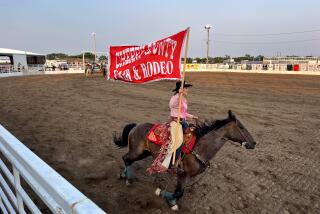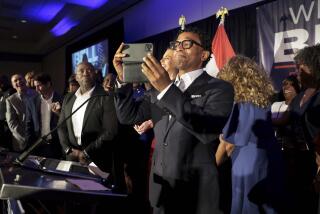Primary Losses Cast a Pall Over Brown’s Campaign : Politics: The candidate remains energetic and upbeat despite poor showings in Nebraska and West Virginia.
- Share via
COLUMBUS, Ohio — For Democratic presidential candidate Edmund G. (Jerry) Brown Jr., the mornings after are getting worse and worse.
“People are pretty despondent,” acknowledged one campaign worker in Ohio, where the dwindling Brown entourage received the news of his latest defeats in Nebraska and West Virginia on Tuesday. “A lot of people tell me they still like what Jerry’s saying but are not going to vote for him because they think he can’t win.”
Although Brown’s advisers did not expect him to beat Arkansas Gov. Bill Clinton, the front-runner, in either state, they had hoped to break 30% in Nebraska--where Brown received only 22% to Clinton’s 48%. Even worse was West Virginia, where the former California governor polled a dismal 12% to Clinton’s 74%.
Together with a new poll suggesting that Clinton even may be nosing ahead of Brown in California, Tuesday’s results put a pall over the campaign that everyone seemed to sense.
Everyone, that is, except the candidate himself, who was up early Wednesday for a morning run before launching into another hectic round of media interviews, press conferences and campus campaign appearances.
Brown, this year’s political equivalent of the bunny in the battery commercial that keeps on going and going, still refuses to drop out of the race.
“I’m not going to stop,” he told supporters in Youngstown, Ohio. “I can’t drop out. . . . I’m the only candidate in the campaign who is telling the truth.”
“Why am I staying? . . . To tell the truth, to get Congress to put money back into the cities and to get the Democratic Party back on the right track, to have it stand as a beacon of light, a conscience for those without a voice,” he said in Toledo.
Brown acknowledges disappointment with Nebraska, but he refuses to believe that his poor showings have to do with him or his campaign. Instead he believes that, as Clinton garners more and more delegates, the dynamics of the political system are forcing more and more Democrats to support the Arkansas governor.
“They’re climbing onto Clinton’s bandwagon even as they’re biting their tongues,” Brown told reporters at Youngstown City Hall. “I’m here to give voters an alternative . . . to keep the politicians from deceiving the people.”
Absent from the campaign speeches are the predictions of a victory that, although always a long shot, seemed tantalizingly within reach after his March win in Connecticut. Gone, too, is the talk about denying Clinton a first-ballot nomination.
After defeats in New York, Pennsylvania, North Carolina, Nebraska and West Virginia, Brown suggested he would be happy to win just enough delegates to go to the convention as a force for change.
“What I’m talking about,” he said, “is getting the Democratic Party back to where it was, on the side of ordinary Americans.”
Toward that end, Brown is planning trips next week to several states with uncommitted delegates in hopes of picking up their support. He also has hopes of doing better in Oregon on Tuesday and in Ohio, which, along with California, holds its primary June 2.
As recently as late April, Brown led Clinton in California, 51% to 37%, according to a Los Angeles Times Poll. But a Field Institute survey released Tuesday showed Clinton with the lead, 49% to 42%.
In Oregon, Brown can expect help from conservationists because of his pro-environment positions and his strong stand against the timber companies, whose logging threatens the spotted owl and other endangered species.
In Ohio, Brown hopes that his strong pro-union position and his call for a major national effort to create more jobs will win support.
“Your future is being systematically cannibalized by the export of jobs and the (downward) pressure on wages,” Brown told several thousand students at the University of Toledo.
“The present political system is guaranteed to fail because it is bought and paid for” by elite corporate interests that care about profits, not people, he said.
Such talk does strike responsive chords on college campuses and in union halls in economically depressed areas across the country.
But if Brown has been able at least partly to overcome the “Gov. Moonbeam” image that haunted him initially, interviews with voters turning out for his rallies suggest he now has another, more unshakable image: that of the political loser.
“I like him. I think he’s got a lot of good ideas. But I’m not going to vote for him,” said Barbara Schultz, a homemaker in suburban Akron, who came to hear Brown at a local Veterans of Foreign Wars hall Tuesday night.
“I don’t like Clinton because I don’t think he has the morals. I think he lies about a lot of things. But most of all, I don’t like Bush, and so I guess I’ll vote for Clinton anyway,” she said. “I’ll vote for Clinton because I want to make my vote against Bush count.”
More to Read
Get the L.A. Times Politics newsletter
Deeply reported insights into legislation, politics and policy from Sacramento, Washington and beyond. In your inbox twice per week.
You may occasionally receive promotional content from the Los Angeles Times.










